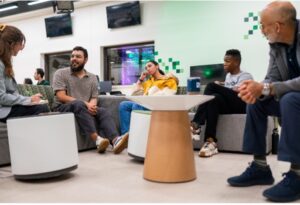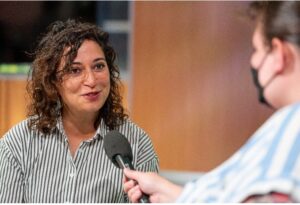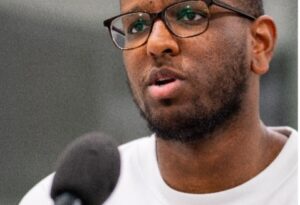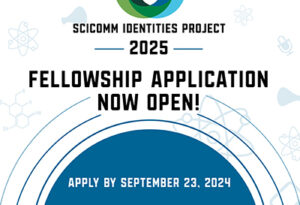 Photo credit: Donte Smith
Photo credit: Donte Smith
By Iasmim Amiden dos Santos
The Knight Center for Environmental Journalism and the Metcalf Institute at the University of Rhode Island held a workshop on inclusive science communication July 15 to 19 at Michigan State University. The workshop, part of the SciComm Identities Project (SCIP), trained environmental scientists in interviewing techniques, podcast script development, and applications of strategic communication and social media techniques.
The workshop is one of the pillars of SCIP. The aim is to transform science communication training in the U.S. by centering the cultural identity and experiences of scientists from marginalized ethnic and racial groups.
 One of the highlights of the workshop was the sessions focused on the development and production of podcasts. Fellows explored narrative structures and techniques for creating compelling stories. According to Dr. Alonso Favela, a SCIP fellow and Assistant Professor of Plant-Microbe Interactions in the School of Plant Sciences at the University of Arizona, the podcast is an attractive medium for society and allows for engagement with different perspectives. “The podcast has given me the opportunity to talk to people in my state and has been a chance to get a different opinion on my research topic from other perspectives,” he said.
One of the highlights of the workshop was the sessions focused on the development and production of podcasts. Fellows explored narrative structures and techniques for creating compelling stories. According to Dr. Alonso Favela, a SCIP fellow and Assistant Professor of Plant-Microbe Interactions in the School of Plant Sciences at the University of Arizona, the podcast is an attractive medium for society and allows for engagement with different perspectives. “The podcast has given me the opportunity to talk to people in my state and has been a chance to get a different opinion on my research topic from other perspectives,” he said.
 Dr. Mallika Nocco, also a SCIP fellow, Assistant Professor, and Extension Specialist in the Department of Biological Systems Engineering at the University of Wisconsin, said, “We’re using podcasts as the example, but I think that you can extend it to a variety of modalities that are science communication products that we could use.” The podcasts are also part of another SCIP objective, which is to develop a novel peer-review process aimed at expanding what counts as academic scholarship.
Dr. Mallika Nocco, also a SCIP fellow, Assistant Professor, and Extension Specialist in the Department of Biological Systems Engineering at the University of Wisconsin, said, “We’re using podcasts as the example, but I think that you can extend it to a variety of modalities that are science communication products that we could use.” The podcasts are also part of another SCIP objective, which is to develop a novel peer-review process aimed at expanding what counts as academic scholarship.
 In addition to the podcasts, fellows practiced interviewing techniques and explored strategies for framing and presenting their research topics, aiming to engage diverse audiences and promote positive societal change. This has also contributed to transforming their own views on science communication. “I’ve always thought that science communication meant we were writing publications for a scientific audience. SCIP has sort of shifted my framing a little bit to start thinking about how do we communicate our sciences back to communities that could use them? How do we communicate them to broader audiences outside of academia? So that skill, in itself, has been amazing,” said Dr. Khalid Osman, Assistant Professor of Civil and Environmental Engineering at Stanford University.
In addition to the podcasts, fellows practiced interviewing techniques and explored strategies for framing and presenting their research topics, aiming to engage diverse audiences and promote positive societal change. This has also contributed to transforming their own views on science communication. “I’ve always thought that science communication meant we were writing publications for a scientific audience. SCIP has sort of shifted my framing a little bit to start thinking about how do we communicate our sciences back to communities that could use them? How do we communicate them to broader audiences outside of academia? So that skill, in itself, has been amazing,” said Dr. Khalid Osman, Assistant Professor of Civil and Environmental Engineering at Stanford University.
The workshop also provided a space for exchanging ideas and building community. “It’s really powerful to have a cohort of people who are all going through similar challenges as yourself and be able to relate to one another, especially considering that we’re all faculty of color across the United States,” Nocco added.
Like other SCIP activities, the workshop is informed by scientific evidence. The SCIP team presented a recent qualitative study on how scientists’ personal and professional identities shape their science communication practices. They also discussed the results of a survey looking at the relationship between identity and communication outcomes, as well as future directions for ongoing studies.
SCIP is a collaborative project between the Metcalf Institute at the University of Rhode Island (URI), the Knight Center for Environmental Journalism at Michigan State University, and the Science and Story Lab at URI, with support from the National Science Foundation (NSF). For more information about the project, please visit: [https://scicommidentities.org/](https://scicommidentities.org/)
Donte Smith contributed to this story.
The SciComm Identities Project is supported by the National Science Foundation under Grants DRL-2115971 and DRL-2115522. Any opinions, findings, and conclusions or recommendations expressed in this material are those of the authors and do not necessarily reflect the views of the National Science Foundation.


 WHAT: A year-long fellowship developed by University of Rhode Island’s
WHAT: A year-long fellowship developed by University of Rhode Island’s  Photo credit: Donte Smith
Photo credit: Donte Smith One of the highlights of the workshop was the sessions focused on the development and production of podcasts. Fellows explored narrative structures and techniques for creating compelling stories. According to Dr. Alonso Favela, a SCIP fellow and Assistant Professor of Plant-Microbe Interactions in the School of Plant Sciences at the University of Arizona, the podcast is an attractive medium for society and allows for engagement with different perspectives. “The podcast has given me the opportunity to talk to people in my state and has been a chance to get a different opinion on my research topic from other perspectives,” he said.
One of the highlights of the workshop was the sessions focused on the development and production of podcasts. Fellows explored narrative structures and techniques for creating compelling stories. According to Dr. Alonso Favela, a SCIP fellow and Assistant Professor of Plant-Microbe Interactions in the School of Plant Sciences at the University of Arizona, the podcast is an attractive medium for society and allows for engagement with different perspectives. “The podcast has given me the opportunity to talk to people in my state and has been a chance to get a different opinion on my research topic from other perspectives,” he said. Dr. Mallika Nocco, also a SCIP fellow, Assistant Professor, and Extension Specialist in the Department of Biological Systems Engineering at the University of Wisconsin, said, “We’re using podcasts as the example, but I think that you can extend it to a variety of modalities that are science communication products that we could use.” The podcasts are also part of another SCIP objective, which is to develop a novel peer-review process aimed at expanding what counts as academic scholarship.
Dr. Mallika Nocco, also a SCIP fellow, Assistant Professor, and Extension Specialist in the Department of Biological Systems Engineering at the University of Wisconsin, said, “We’re using podcasts as the example, but I think that you can extend it to a variety of modalities that are science communication products that we could use.” The podcasts are also part of another SCIP objective, which is to develop a novel peer-review process aimed at expanding what counts as academic scholarship. In addition to the podcasts, fellows practiced interviewing techniques and explored strategies for framing and presenting their research topics, aiming to engage diverse audiences and promote positive societal change. This has also contributed to transforming their own views on science communication. “I’ve always thought that science communication meant we were writing publications for a scientific audience. SCIP has sort of shifted my framing a little bit to start thinking about how do we communicate our sciences back to communities that could use them? How do we communicate them to broader audiences outside of academia? So that skill, in itself, has been amazing,” said Dr. Khalid Osman, Assistant Professor of Civil and Environmental Engineering at Stanford University.
In addition to the podcasts, fellows practiced interviewing techniques and explored strategies for framing and presenting their research topics, aiming to engage diverse audiences and promote positive societal change. This has also contributed to transforming their own views on science communication. “I’ve always thought that science communication meant we were writing publications for a scientific audience. SCIP has sort of shifted my framing a little bit to start thinking about how do we communicate our sciences back to communities that could use them? How do we communicate them to broader audiences outside of academia? So that skill, in itself, has been amazing,” said Dr. Khalid Osman, Assistant Professor of Civil and Environmental Engineering at Stanford University.